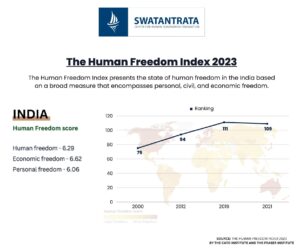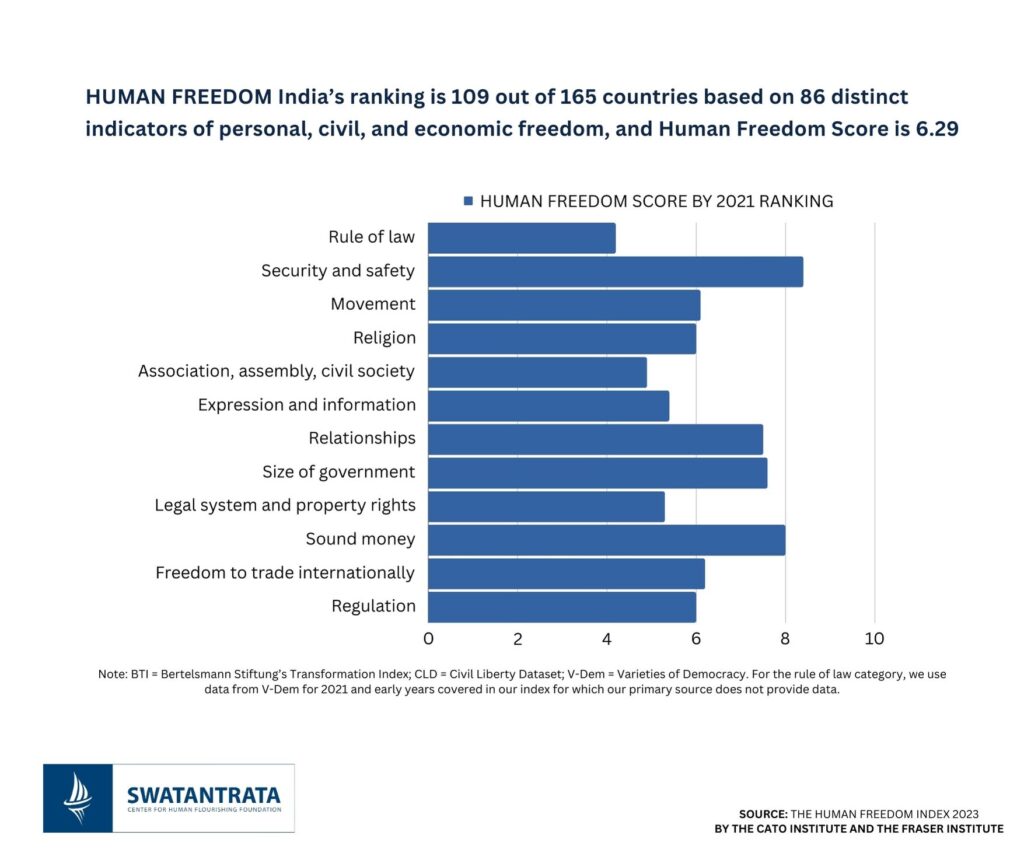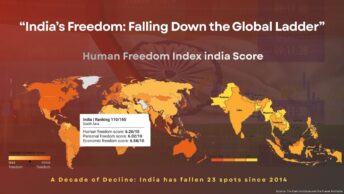 The latest Human Freedom Index report, jointly released in December 2023 by the Washington-based Cato Institute and the Vancouver-based Fraser Institute, rated India 109 out of 165 countries assessed. The HFI covers 165 countries based on 86 distinct indicators of personal, civil, and economic freedom, using data from 2000 to 2021, the most recent year for which sufficient data was available. India scored 6.29, which is well above the global average of 6.75 and puts the country seventh in South Asia.
The latest Human Freedom Index report, jointly released in December 2023 by the Washington-based Cato Institute and the Vancouver-based Fraser Institute, rated India 109 out of 165 countries assessed. The HFI covers 165 countries based on 86 distinct indicators of personal, civil, and economic freedom, using data from 2000 to 2021, the most recent year for which sufficient data was available. India scored 6.29, which is well above the global average of 6.75 and puts the country seventh in South Asia.
The report states that following the outbreak of the second year of the coronavirus pandemic witnessed a further decline in global freedom. From 2019 to 2021, 90 percent of the world’s population saw a fall in overall freedom, including significant declines in the rule of law, freedom of movement, expression, association and assembly, and freedom to trade.
 The countries that took the top 10 places, in order, were Switzerland, New Zealand, Denmark, Ireland, Estonia, and Sweden (tied at 5), Iceland, Luxembourg, Finland, and Norway. Switzerland tops the rankings again this year, followed by New Zealand. The United States climbed four positions in the overall freedom rankings, moving from 21st in 2020 to 17th in 2021. Its score on a ten-point scale improved slightly from 8.32 in 2020 to 8.39. The US economic freedom rating saw an increase from 8.11 in 2020 to 8.14 in 2021, and its personal freedom score also saw an increase from 8.47 in 2020 to 8.57 in 2021.
The countries that took the top 10 places, in order, were Switzerland, New Zealand, Denmark, Ireland, Estonia, and Sweden (tied at 5), Iceland, Luxembourg, Finland, and Norway. Switzerland tops the rankings again this year, followed by New Zealand. The United States climbed four positions in the overall freedom rankings, moving from 21st in 2020 to 17th in 2021. Its score on a ten-point scale improved slightly from 8.32 in 2020 to 8.39. The US economic freedom rating saw an increase from 8.11 in 2020 to 8.14 in 2021, and its personal freedom score also saw an increase from 8.47 in 2020 to 8.57 in 2021.
Freedom of expression and freedom of religion in India take the biggest hit.
All regions saw decreases in freedom of expression, the indicator that experienced the largest decline in our index after freedom of movement, confirming what some scholars have termed a global free speech recession. The report indicates that freedom of religion has suffered declines in every region, especially in South Asia, East Asia, and sub-Saharan Africa. Specifically, India’s Freedom of Religion scored 4.7 out of 10; Religious Organization Repression: 7.3 out of 10; and Overall, Religion Freedom: 6.0.
The Indian Constitution explicitly protects and upholds religious freedom, and free societies respect the right to practice a religion of one’s choosing. The exercise of religion can be both a supremely private matter involving a person’s strongest beliefs and a social affair practiced in an organized way among larger groups.
Over the past seven years, religious discrimination, religious organization repression, and intolerance of social dissent have reached their peak. In some states, there have been growing indicators of Hindu bigotry and bigotry over religious freedom and institutions.
 Authorities were openly critical of human rights defenders and organizations, contributing to a climate of hostility against them. Mob violence intensified, including by vigilante cow protection groups. Press freedom and free speech in universities came under attack. The Supreme Court and High Courts delivered several progressive judgments, but some rulings undermined human rights. Impunity for human rights abuses persisted.
Authorities were openly critical of human rights defenders and organizations, contributing to a climate of hostility against them. Mob violence intensified, including by vigilante cow protection groups. Press freedom and free speech in universities came under attack. The Supreme Court and High Courts delivered several progressive judgments, but some rulings undermined human rights. Impunity for human rights abuses persisted.







